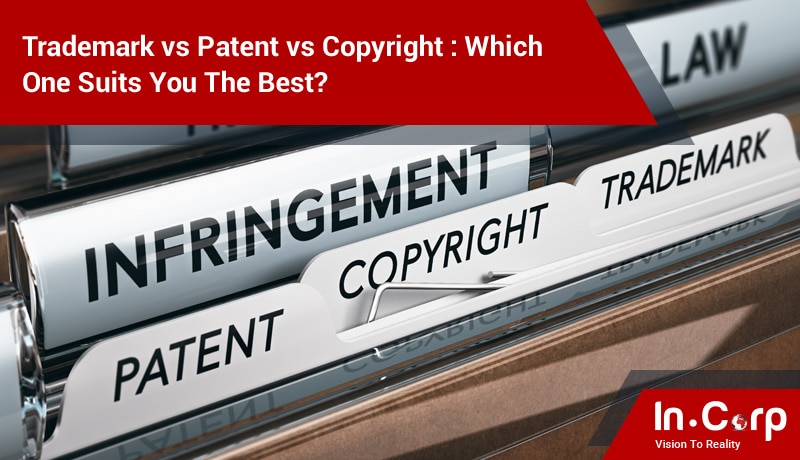Entrepreneurs in India slowly but steadily recognise the importance of intellectual property. This article discusses intellectual properties such as copyright, patents, and trademarks, as well as how they can help you protect your entrepreneurial ideas. Continue reading to find out which of the three options best suits your company’s needs.
Table Of Contents
What is Intellectual Property?
What is a Trademark, and what are its advantages?
What is a Patent, and what are its advantages?
What is Copyright, and what are its advantages?
What is the difference between a Trademark vs Patent vs Copyright?
How can InCorp help you?
What is Intellectual Property?
Intellectual property (IP) includes scientific discoveries, literary and creative works, designs, and so on. The three most commonly known types of intellectual properties that you should be aware of are:
- Trademarks
- Patents
- Copyrights
What are Intellectual Property Rights (IPR)?
Intellectual Property Rights (IPRs) are legal rights that allow you to safeguard your intellectual inventions. These rights aid in the development of your company’s brand.
What is a Trademark, and what are its advantages?
A trademark is any word, symbol, or logo that helps consumers distinguish a product from its competitors. Trademark registration is an essential part of your company’s branding since they keep it distinct and distinctive. The exclusive right to use, sell, and alter your brand or goods in any way is granted by trademark registration.
Trademark registration is necessary since it aids in the development of your company’s brand image. Trademarks in India are divided into 45 different types or divisions. For example, a class could be footwear, metal export, or face cream manufacture. Your trademark can be registered in any of the above-mentioned classes.
Advantages of owning your Trademark:
Related read: Everything You Need To Know About The Trademark Registration Process In India
What is a Patent, and what are its advantages?
The purpose of a patent is to gain a competitive advantage. A patent gives you the exclusive right to create, use, trade, or import what you’ve invented after it’s been granted. The patent owner is the sole owner of the rights to sell or utilise the patent.
Patents are particularly significant in the industrial and pharmaceutical industries. The creator/company is the exclusive owner of the right to use the process with a patent in place.
Advantages of obtaining your Patent:
Related read: How To Avoid Trademark Infringement?
What is Copyright, and what are its advantages?
Copyright corresponds to the exclusive right to produce, reproduce, promote, and sell your original work. Musical, literary, artistic, architectural, or theatrical works make up the majority of these pieces.
Programs, compilations, databases, and tables are examples of electronic works considered literary works. Furthermore, registering copyright serves as a deterrent to copycats misrepresenting or exploiting your original work.
Advantages of acquiring your Copyright:
What is the difference between a Trademark vs. Patent vs. Copyright?
| Particulars | Trademark | Patent | Copyright |
| Meaning | It is a unique identity or expression used to identify your specific company or its goods or services | It is a perfect way to protect your creations and gives you the sole right to our design | It is a legal right that protects the copying of your creative work |
| Term of registration | It can be registered for a term of 10 years, after which you can renew it for another ten years. | It is awarded for 20 years from the date of application. | It is dependent on the nature of your work. It lasts throughout the author’s lifetime and even after their death in literary, musical, or artistic work. |
| Protection covers products/ ideas such as | Any word, symbol, or other characteristic that differentiates one rival from another in the same field. | Inventions such as a specific procedure, the composition used to create an element, and so on. | Books, articles, songs, sound recordings, and other original works of authorship. |
| Rights granted | Right to use the mark and prevent others from using the same mark to identify goods or services based on your brand. | Right to stop others from producing, selling, or importing your patented invention. | Control over the replication and distribution of your original work is a legal right. |
How Can InCorp Help You?
Thousands of business ideas pass through our heads every day, and a few of them may be exceptional or noteworthy. Your idea may or may not be protected by intellectual property law. However, your final creation with that exceptional idea could be protected under Intellectual property laws. Copyrights, patents, and trademarks can all be used to protect or preserve your work. They safeguard you (goods and service providers) by allowing you to control how your products/designs are used.
India offers a wide range of intellectual property rights to business owners. Choosing which intellectual property to use, on the other hand, can be a lengthy and complicated process.
That’s where our knowledgeable team of experts with years of experience can assist you.




